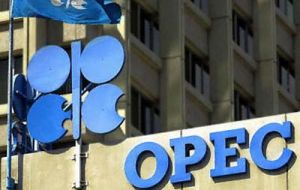MercoPress. South Atlantic News Agency
OPEC maintains oil output; quotas to new members

OPEC froze oil output levels on Wednesday, resisting calls for a hike to help cool sky-high prices that have flirted with 100 dollars and which threaten to dampen global economic growth.
The Organisation of Petroleum Exporting Countries decided against an increase of 500,000 barrels per day to its official production levels at a ministerial meeting in Abu Dhabi, insisting the market was "well supplied." But in Paris the International Energy Agency, which monitors energy policies in developed countries, said consumer anxiety about oil shortages would remain, even if OPEC was producing above its daily ceiling of 27.25 million barrels. OPEC, which supplies about 40% of the world's crude, insisted on Wednesday it was not responsible for the price of crude soaring to a record high of 99.29 US dollars a barrel on November 21. "The market is not controlled by supply and demand ... It is totally controlled by speculators who consider oil as a financial asset," the cartel's secretary general Abdalla al-Badri told a press conference. Crude futures rallied more than two dollars on Wednesday in the wake of OPEC's latest output decision to reach more than 91 dollars a barrel in London. They later stood at 90.03 dollars, up 50 cents. High oil prices are bad news for consumers, who must pay more for fuel and energy bills. But they benefit energy producers, which see their profits rocket. On Wednesday, OPEC also announced an extraordinary meeting for February first in Vienna, "given the need for extreme vigilance in assessing the market during the coming months". The cartel would still meet on March 5 for its scheduled gathering. OPEC's latest output decision was reached after oil producers put aside differences. On Tuesday, Saudi Arabia had said all options were on the table, which suggested it temporarily favoured an output hike. Saudi Arabia, the world's biggest producer of crude, is the only OPEC member with sustainable spare capacity. Among OPEC's 13 member-nations that had firmly opposed a supply increase in the UAE capital were Iran, Libya, Qatar and Venezuela. They are concerned that an increase in production would oversupply the market during the second quarter, when demand for heating fuel falls as winter passes in the northern hemisphere. Venezuela said on Wednesday that a hike in production would also risk igniting heavy losses for oil prices. OPEC last decided to raise production in September when it agreed to provide the market with an extra 500,000 barrels of oil per day. The increase took effect on November first. Wednesday's meeting in Abu Dhabi also decided to hand production quotas to new members Angola and Ecuador. Angola, which joined the cartel on January 1, was handed a quota of 1.9 million barrels of oil per day at the latest meeting. Ecuador, which rejoined OPEC last month, was given a daily quota totaling 520,000 barrels. When the quotas come into effect at a date yet to be confirmed, OPEC's official daily output ceiling would rise to 29.67 million barrels. Oil prices have risen about 40% since August, boosted by the weak dollar, concerns over falling oil inventories and speculative inflows.




Top Comments
Disclaimer & comment rulesCommenting for this story is now closed.
If you have a Facebook account, become a fan and comment on our Facebook Page!